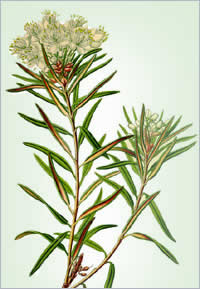|
|
It may seem impossible, but at one time in this our world, all ale was made without hops. Beer was quite a different beverage back then. Brewers were still experimenting with large varieties of herbs, trying to find the perfect addition to their malty brews. Of the many differing herbs, it is documented that our brewing ancestors used wormwood, marsh rosemary, yarrow, nettle, sage, and more to make differently inebriating herbal beers. Now that we are living in the golden age of micro brews, brew masters all over the country have been experimenting with ancient recipes and ideas about what can make a good beer… but will hops ever be dethroned from the throne of well-loved beer ingredients?
Though it is little known, hops has not always been an ingredient for beer. In the 4,000+ year history of beer, the dominance of hopped ale has only taken place over the last 700 years or so. According to Stephen Buhner in his book Sacred and Healing Herbal Beers, one of the first uses of hops in ale was that of breweries in the Netherlands in the 14th century. Before hops took over the scene, the most popular beer was a brew known as Gruit. According to Buhner, Gruit contained many herbs that had opposite effects on the drinker than hops. Gruit ale allegedly stimulates the mind, increases sexual drive, and creates euphoria, whereas the effects of hopped ale cause drowsiness, and subdue sexual ability (even if the anti-inhibitatory effect of alcohol does cause more pick-up lines to be used).
It is doubtful that hops will ever be widely replaced by another herb, given the static tendencies of the world we live in, but there is still a market for ale without hops. Some people disdain the bitter taste hops add to beer, some dislike the sedative qualities of the plant, and a few are even allergic to hops. For this niche market, beer can be made entirely without hops. To make ale without hops, it is necessary to look at the properties that hops have that make them so ideal for brewing.
Hops have a lot of beneficial qualities for beer. Beside the flavor, which is well loved the world ‘round, the antibacterial qualities of hops helped greatly to keep ale from spoiling. This must have been a great benefit for brewers in the age before refrigeration. Curiously, the use of other herbs to help ale keep is well documented from before the age of hopped beer. So what caused the huge swing in favor of hopped ale?
Buhner links the rise in popularity of hopped ale with the Protestant movement’s anti-drug sentiments. Laws forbidding the herbs used in Gruit were among the first anti-drug laws passed into law. Little did the hopped beer advocates know at that time, but this protestant sentiment would eventually grow into the temperance movement and result in prohibition.
One ale without hops that is making a strong resurgence is Heather Ale. Heather ale is a Gruit-style ale being made with heather instead of hops. The re-introduction of heather ale started in the land of its origin, Scotland. Fraoch claims that heather ale goes back to 2,000 B.C., with a tenuous life on the fringes of society for the last 4,000 or so years. In 1986, home brew shop owner and brewer Bruce Williams found a recipe for heather ale translated from Gaelic, and has been mounting a crusade to re-introduce heather ale to the world ever since. Williams’ crusade has turned out to be quite effective. Fraoch has now become the first Gruit-style ale to go “international”, re-establishing a tradition which was almost eradicated from the world.



